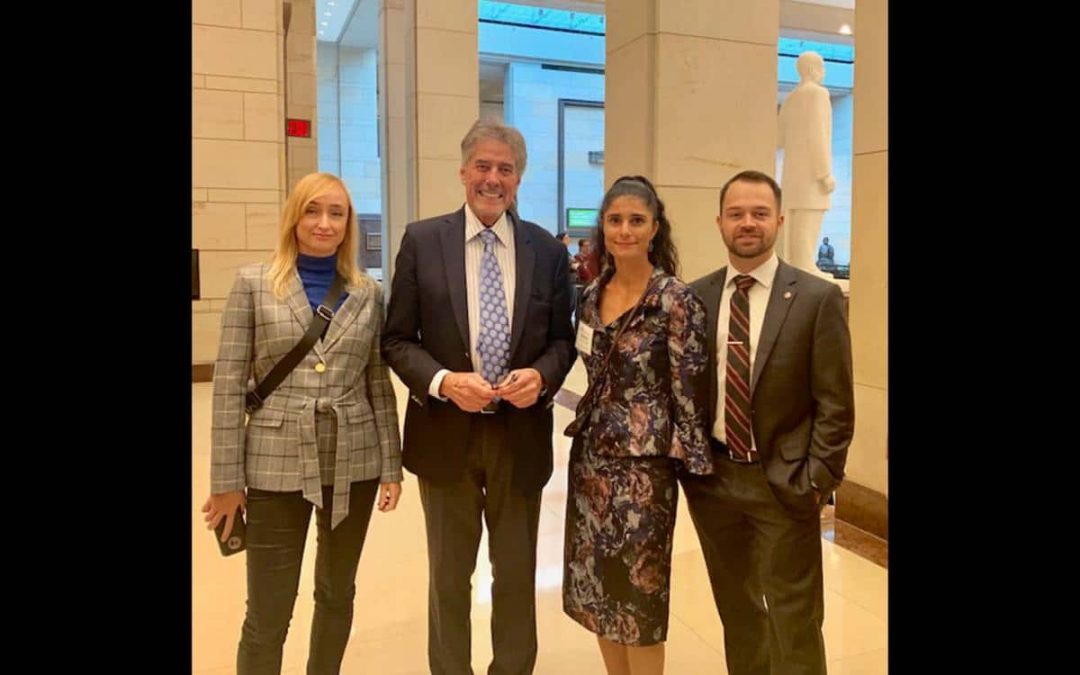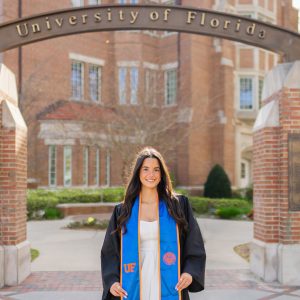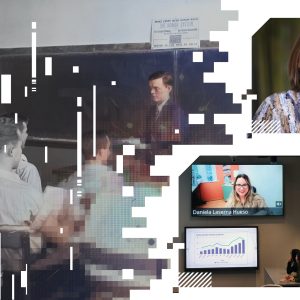Inaugural Washington Campus residency highlights the critical connection between government and business for this UF MBA student
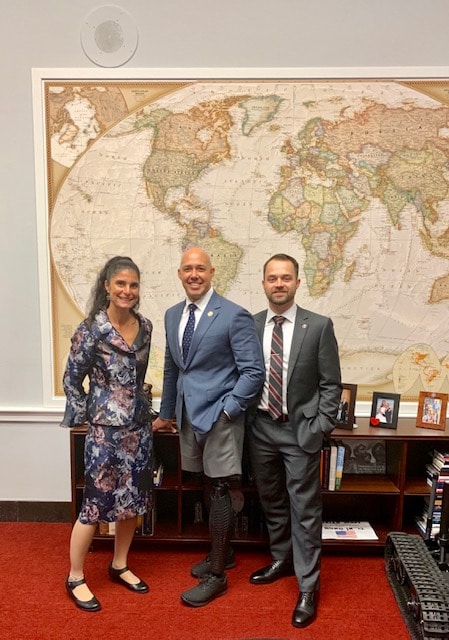
UF MBA students Ramona Saridakis Bean and Adam Despang with Rep. Brian Mast.
By Ramona Saridakis Bean, MBA ’20
This October, I had the opportunity to be part of the inaugural UF MBA group to participate in the Washington Campus residency based in Washington, D.C. in a program called Managing Business, Public Affairs, and Public Policy. My resume includes experience as a legislative aide on Capitol Hill for a former Florida congressman and time as a political appointee assigned to the U.S. Treasury Department under Secretary Henry Paulson during President George W. Bush’s administration, so I was excited to be a part of this trip as I get ready to transition back into the office space realm after spending the last decade taking care of three young children and assisting elderly grandparents in the home.
The overall flow of our week with the Washington Campus included listening to a variety of speakers who spanned the spectrum of former elected officials, press media, civil servants, former political appointees, lobbyists, private sector professionals, think tanks, advocacy groups and non-partisan educators. What set this apart from other guest speaker events I’ve attended were the candid discussions that came during the Q&A periods after each presentation. The caveat was that these sessions were not to be video recorded and that we as an audience agreed that we wouldn’t directly quote the speakers themselves afterwards—given the richness of what was shared by those who presented to our group, it was well worth agreeing to those confidentiality terms.
Every day of the program also had an opportunity for our group to interact in an activity that gave us a brief look into what it would be like to fill a specific role in public policy. For example, the Concord Coalition produced a budget game group activity that divided us into 10 groups that each represented a state with different priorities, demographics and competing interests. We were charged with finding ways to reduce the projected federal deficit over the next 10 years. The results of this game varied, yet the consensus amongst our MBA colleagues in the class is that it helped each student explore the mechanizations necessary to reach compromises, state clear arguments and, in the end, explain to the rest of the “states” why certain cuts were made in the federal budget.
The highlight of the Washington Campus week was on Wednesday, aptly dubbed Capitol Hill Day. Former Member of Congress the Honorable M. Robert Carr started the day off by giving our group a personal tour of the House Floor and afterwards in the Capitol Rotunda area. As a former Hill staffer, I was aware of how special an experience this was and conveyed gratitude to the Washington Campus staff for helping make this possible, especially for those in our residency group that had never been in the Capitol building. The staff also ensured that we had scheduled meetings with both of our very own Florida Senator Rick Scott and a legislative aide with Senator Marco Rubio’s office. If there was a highlight from the entire D.C. residency, it came during our meeting with Senator Rick Scott when our group was able to squeeze into his back conference room and given the opportunity to ask him direct questions after he gave a brief overview of his role as our elected senator. I had the opportunity to extend our thanks for his work during the Hurricane Irma aftermath while he served as Florida’s governor and asked him what he was planning to do as Senator Scott to help the situation with our waterways in South Florida where the incidence of toxic algae blooms continues to rise. The rest of the day our group was given a detailed list of opportunities for us to respectively check out House and Senate committee hearings, meet with any of our local representatives, visit places like the Library of Congress’ Jefferson Building, or to simply use one of the floor passes to sit in the gallery of either the House or Senate to listen to Congress conduct live debate.
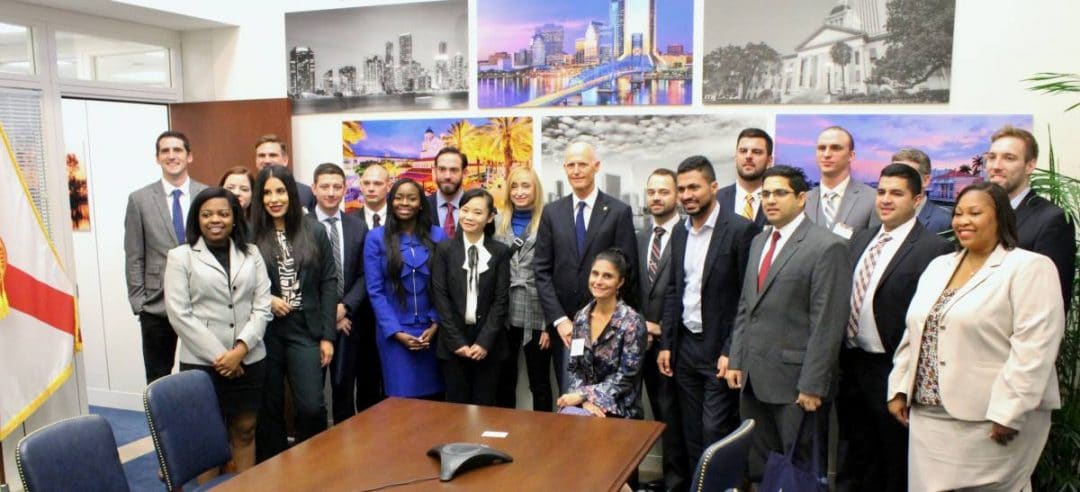
UF MBA students meet with Sen. Rick Scott during the Washington Campus residency program.
The social networking portion was also a great benefit to participating in the Washington Campus D.C. residency program. There were scheduled receptions that the Washington Campus organized and funded, while a few other evenings our group spontaneously found new friends and colleagues within to self-organize activities like taking a walk down to the National Portrait Gallery Museum or finding a new place to have dinner in local hotspots like Georgetown or Adams Morgan. Lunch time was also a good way to meet new people, commiserate with our current colleagues and get to know our D.C. residency teams.
There was a classwork portion to the program that was two-fold. As mentioned before, the Washington Campus staff randomly selected D.C. residency teams, and we were tasked with a group project that required us to select a topic and draft a presentation relating to how we would either push for a certain public policy idea, create a government relations team and so forth. On the last day of the residency we were formally assigned a take-home exam consisting of essay questions to help us re-examine the various subjects we’d learned about during our week in Washington, D.C.
Personally, I would not only recommend participating in this D.C. residency program with the Washington Campus to my UF colleagues, I believe it should be a requirement for all future MBA programs to include something like this to help educate business students about how public policy and government advocacy truly mix with the business world. New legislation, including tax code changes, and federal regulations can affect small business owners and big corporations with their shareholders alike. Additionally, many business leaders may evolve in their respective careers to serve in elected office, and it’s priceless to understand how public policy and politics can affect the bottom line for American citizens and the companies they use through consumption.
I’m happy to answer any direct questions from fellow Warrington students and want take this opportunity to publicly thank those with the UF MBA staff that helped make this D.C. residency program with the Washington Campus accessible to our program.
Go Gators.


